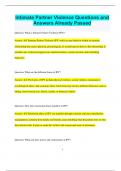Intimate Partner Violence Questions and
Answers Already Passed
Question: What is Intimate Partner Violence (IPV)?
Answer: ✔✔ Intimate Partner Violence (IPV) refers to any behavior within an intimate
relationship that causes physical, psychological, or sexual harm to those in the relationship. It
includes acts of physical aggression, emotional abuse, sexual coercion, and controlling
behaviors.
Question: What are the different forms of IPV?
Answer: ✔✔ The forms of IPV include physical violence, sexual violence, emotional or
psychological abuse, and economic abuse. Each form may involve different behaviors such as
hitting, forced sexual acts, threats, insults, or financial control.
Question: How does emotional abuse manifest in IPV?
Answer: ✔✔ Emotional abuse in IPV can manifest through constant criticism, humiliation,
manipulation, isolation from family and friends, and controlling what the partner does or who
they interact with. It aims to erode the victim's self-esteem and sense of autonomy.
Question: What role does power and control play in IPV?
1
,Answer: ✔✔ Power and control are central to IPV, where the abuser seeks to dominate their
partner. This can involve using intimidation, coercion, and manipulation to maintain control over
the victim’s actions, emotions, and decisions.
Question: What are some of the common risk factors for experiencing IPV?
Answer: ✔✔ Common risk factors include substance abuse, a history of violence or abuse,
economic stress, social isolation, lack of support systems, and cultural or societal norms that
condone violence against women or enforce strict gender roles.
Question: How does IPV affect the physical and mental health of victims?
Answer: ✔✔ IPV can lead to a range of physical injuries, chronic health issues, mental health
problems such as depression, anxiety, PTSD, and substance abuse. The stress and trauma from
IPV can have long-term impacts on a victim's overall well-being.
Question: What are some strategies for preventing IPV?
Answer: ✔✔ Strategies for preventing IPV include education and awareness programs,
promoting healthy relationship behaviors, community support initiatives, legal interventions, and
advocacy for policies that protect victims and hold abusers accountable.
Question: What is the significance of safety planning for individuals experiencing IPV?
2
, Answer: ✔✔ Safety planning involves creating a personalized, practical plan that helps
individuals protect themselves and their children in situations of danger. It includes identifying
safe places, preparing an emergency kit, and having contacts for help.
Question: How can communities support victims of IPV?
Answer: ✔✔ Communities can support victims by providing access to resources such as shelters,
counseling services, legal aid, and hotlines. They can also foster a supportive environment by
raising awareness, challenging stigmas, and promoting a culture of respect and non-violence.
Question: What are the challenges faced by victims of IPV when seeking help?
Answer: ✔✔ Challenges include fear of retaliation, lack of financial independence, social
stigma, fear of losing custody of children, cultural or religious barriers, and lack of access to
support services or legal protection.
Question: How can healthcare professionals identify and intervene in cases of IPV?
Answer: ✔✔ Healthcare professionals can identify IPV through routine screening, recognizing
signs of abuse such as unexplained injuries or anxiety, and providing a safe environment for
victims to disclose abuse. They can also refer victims to appropriate support services.
Question: What legal protections are available for victims of IPV?
3




